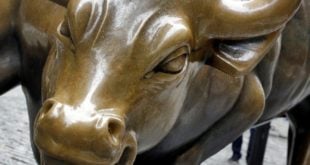Add Credit Suisse to the never ending parade of fear mongerers trying to persuade the British people to be subservient to the idle demands and caprices of effeminate men in Brussels. After all, most British people are a rubish sort, creatures of the night, traversing the coal imbued foggy streets of London in search of ale and hookers. The men in Brussels will make sure the British factories are properly outfitted with environmental filtration systems, to save the planet from a carbon apocalypse. Failure to do so will result in the seizure of said factories, to be auctioned off to the highest German bidder, should said factory owner fail to pay his carbon credit fine.
Credit Suisse is warning to never go ‘full BREXIT.’
“Into a full Brexit scenario, the impact of a stronger dollar (including the implications on both commodities and the renminbi) and disruption to the European growth cycle would be cause for us to revise down our S&P 500 year-end target,” the analysts write.
A U.K. departure from the eurozone would also impact European equities, the Credit Suisse team wrote. The firm said it will lower its year-end target for the FTSE 100 to 6,200 from 6,600 and Euro Stoxx 50 to 2,950 from 3,350. The FTSE is currently trading around 6,250 and the Euro Stoxx 50 is at 2,980.
However, the team says it is not ready to turn bearish on equities as a whole given bond markets look relatively expensive and their expectation that there will be a further shift of assets from bonds into equities once yields rise.
“Put simply, equities are neutrally valued in a world where real estate, TIPs [Treasury Inflation-Protected Securities], government bonds and thus credit are expensive,” they said in an earlier note.
The BREXIT fear comes to an end tomorrow, unfortunately. I rather enjoyed its devilish menace and hope we could get involved with another scary story, such as this one, in the not too distant future. My holdings in bonds will go higher, regardless of BREXIT. “The Fly”, all in all, is a far superior human being than all of you, not just a better investor. When I am proven right on this trade, by the inversion of the yield curve, I only ask that you cease coming to these halls from the front entrance. Instead, traverse these grounds from the back exit, and make your way around these halls through the unpainted service stairwells.
None of you little fuckers can hold a candle to me.
If you enjoy the content at iBankCoin, please follow us on Twitter





Do you think the market tanking will be the catalyst that ultimately sends the yield curve over the cliff?
Recession gets yield curve inverted
Fly, could we get a couple of peanut gallery posters promoted and get Cain Thaler and Jeff Macke off the mobile app? Strictly content wise, no criticisms here, all hail the ark, bully bully.
Our app was made by a third party. I have no direct control over it. Use mobile browser.
What the heck happened to those two? Especially Macke, greeted with such fanfare.
A shame Jeff Macke doesn’t post anymore, but his work here is a repository of market wisdom. I hope it’s left for others to learn from.
Fly, I have looked at the 2 vs 10 years yield. The 2 years yield was highest relatively to the 10 years yield in 1980. The 2 years was then 15%, the 10 years 12.5%.
So I am a little confused. Why would an inverted curve mean you are right to be long TLT?
Even in the latest move to inverted curve in 2007, before the recession hit, it’s not the 10 years yield that went down, it’s the 2 years yield that caught up with it.
In 1998-1999, during the tech bubble, the 2 years was similar to the 10, obviously it wasn’t recession time just yet…
Can you please clarify your argument? Based on historical patterns, your argument seems invalid…
Short dated yields will rise as long dated fall. This has happened every time preceding a recession.
Ooh, I love these moments. It’s like the calm before the storm. My snout is tingling.